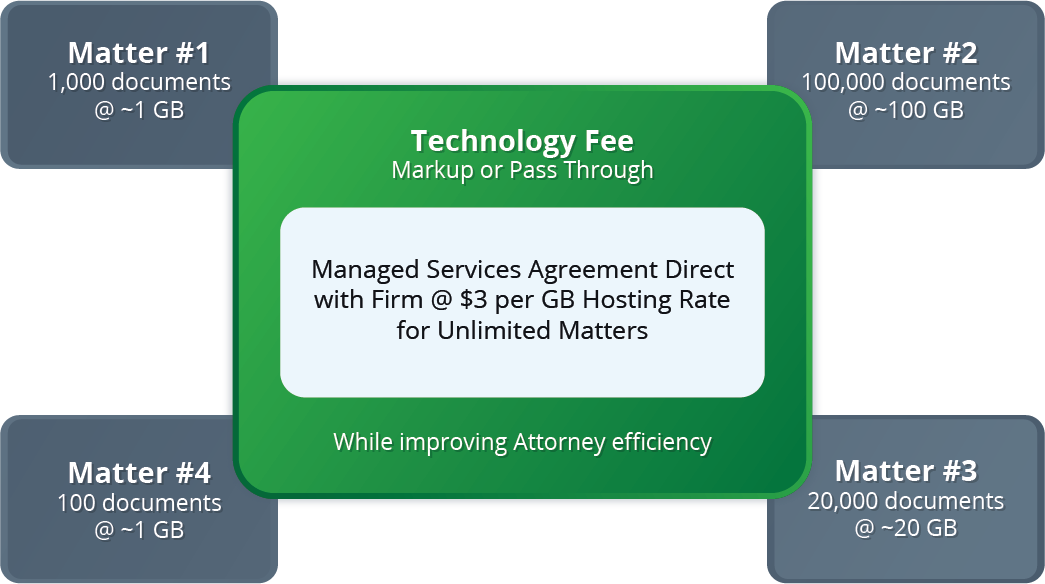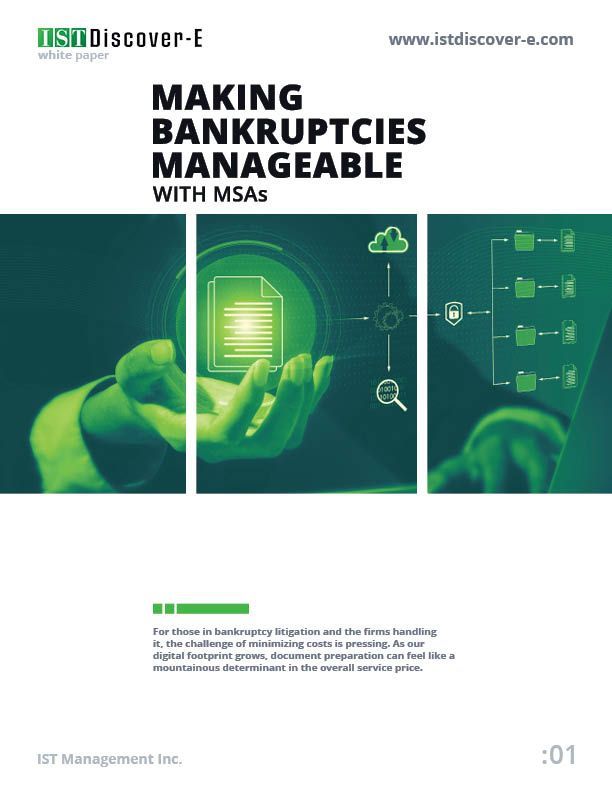Making Bankruptcies Manageable with MSAs
The data on bankruptcy trends shows that filings have increased since 2022. Total bankruptcy filings were up 17%, Chapter 11 commercial filing increased by 68%, and small business filings increased by 55% since the first half of 2022. For some, this data is additional evidence of our uncertain economy. With waning federal relief and a looming debt wall from the pandemic, many organizations may feel stressed competing in a high-interest-rate environment and consider bankruptcy.
For those in bankruptcy litigation and the firms handling it, the challenge of minimizing costs is pressing. As our digital footprint grows, document preparation can feel like a mountainous determinant in the overall service price. Without advanced software like Relativity, document preparation can be a lengthy trial-and-error process that consumes your attorney’s time and technology bill. This advantage is not news, yet many firms may not be in the position to fund or power their own instance of a software fully.
Instead, firms should consider an instance of Relativity through a Managed Service Agreement, upending the struggle of document preparation with the additional support of a leading eDiscovery provider.
Targeting ESI
Electronically stored information (ESI) has made litigation more complex, and as more technology frames the legal world, this complexity will only continue to become more nuanced. For any litigant, this data sprawl means a higher cost to target necessary information effectively, but minimizing this cost is vital for those undergoing bankruptcies and foreclosures. Debtors are already facing limited resources, and firms assisting must consider proportionality in their preparation.
Consider a corporation facing bankruptcy to fully realize how data can quickly drive the cost of eDiscovery. Based on reports from 2019, the average employee sends and receives at least 50,000 emails per year, translating to 10GB of data. This number, paired with documents from hard drives, personal devices, and other media in addition to hard copy files, escalates the ESI rapidly. The challenge of targeting archives accurately while keeping costs manageable can stress even the most prepared firm.
Managing the mountain of documents through a Managed Service Agreement (MSA) can alleviate the pressure of minimizing costs by identifying a fixed monthly fee determined by data volume. Regardless of the data making up each bankruptcy case, firms can act confidently in their service cost and better define their technology fees for their clients.

Efficiency in Production
In addition to clarifying cost structures to data volume, MSAs improve service quality through enhanced workflows in Relativity. Those managing document preparation through standard file searches already know how in the weeds a workflow can quickly get. It requires the user to experiment with date ranges, specific keywords, and numerous revisions, cluttering the workflow and, ultimately, costing more. In Winfield v. City of New York, 2017, a court ordered the City of New York to search 200,000 documents using 665 additional plaintiff-developed search terms, costing the city an additional nearly $250,000. This process would be better suited with more advanced search tools through Relativity, such as technology-assisted review (TAR), to sort the relevant from irrelevant and prioritize responding documents. TAR, machine learning, and expansive data analysis methods resolve what can feel like a stuttered process in finding the correct information, saving clients time and money.
Valuable document preparation happens from the start during preservation. Failure to preserve all documents can end in the spoliation of evidence, resulting in sanctions. Using Relativity with the support of a project management team to collect and analyze data will ensure you’re doing so completely and accurately.
Clarifying Costs for Firms and Litigants
Those undergoing bankruptcy are already operating from a deficit, challenging firms to confidently define the service cost upfront. MSAs ensure this for both firms and their clients through a monthly fee that can reflect one bankruptcy case or multiple. Applying software like Relativity to document preparation can allow firms to search documents in segregated databases seamlessly instead of multiple folder-based systems. As firms understand their upfront cost through the MSA, they can ensure a profit through their technology fees to clients and confidently take on more cases.
Bankruptcy litigation poses different challenges from other litigation cases. It moves quickly, and cost minimization is paramount for debtors and the firms representing them. As data suggests, bankruptcy filings are increasing, so finding the best method to tackle the immense weight of document preparation will position your firm as technology-focused and committed to customer service.




